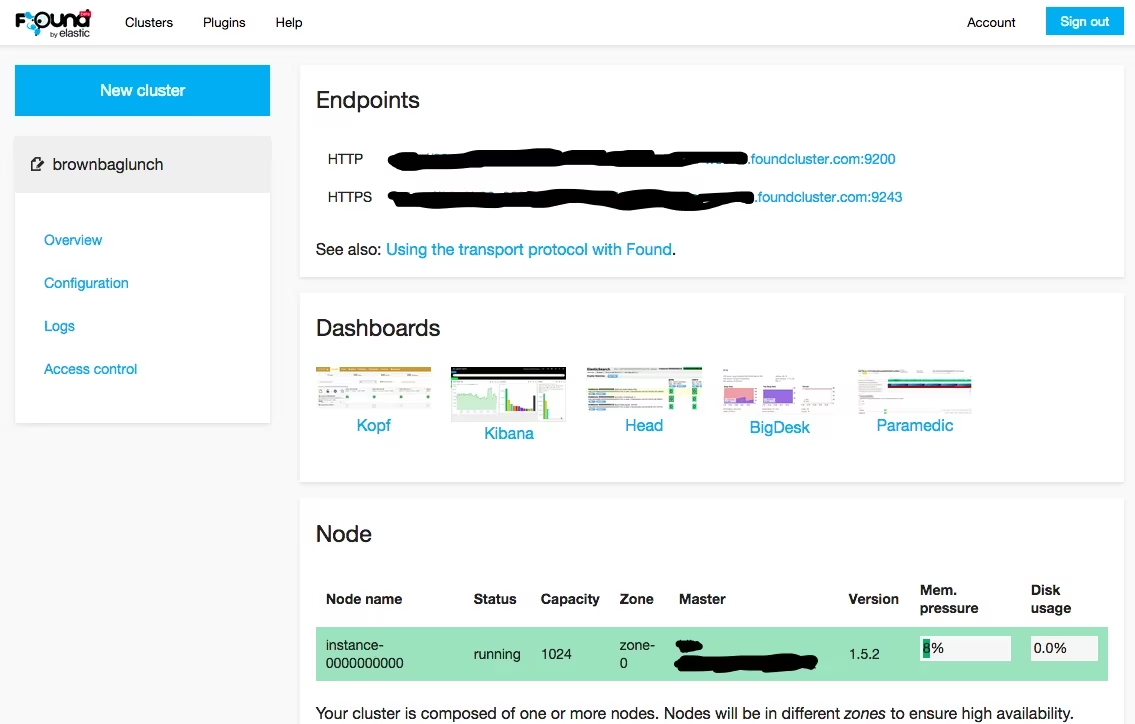
Using Found by elastic cluster helps a lot to have a ready to use and managed elasticsearch cluster.
I started my own cluster yesterday to power brownbaglunch.fr website (work in progress) and it was ready to use after some clicks!
It’s a kind of magic!
But I ran into an issue when you secure it and use the elasticsearch javascript client .
Creating your cluster

Found Console
Adding ACL
By default, your cluster is opened but you can fix that by opening “Access Control” menu. Found proposes a default configuration which generates two users and restrict some access.
# Deny everyone by default, as authentication is required.
# Deny is the default also if no "default" is specified,
# so it's only necessary to specify it if you want the
# default to be "allow".
default: deny
auth:
users:
searchonly: searchonlypassword
readwrite: readwritepassword
rules:
- paths:
# Match all search requests.
- '/_search|/([^_/]+/_search)|/[^_/]+/[^_/]+/_search'
conditions:
- basic_auth:
users: [searchonly]
action: allow
# Also, allow any GET-request.
- paths: ['.*']
conditions:
- basic_auth:
users:
- searchonly
- method:
verbs: [GET]
action: allow
# Allow everything for the readwrite-user
- paths: ['.*']
conditions:
- basic_auth:
users:
- readwrite
# Uncomment the following if you want to require SSL.
# - ssl:
# require: true
action: allow
Create your javascript application
<!DOCTYPE html>
<html>
<head>
<script src="https://cdn.rawgit.com/elastic/bower-elasticsearch-js/12ec0b8ee6d776e077b160e6dd6fc2e1b5818a86/elasticsearch.min.js"></script>
</head>
<body>
<script>
var login = "readwrite";
var password = "readwritepassword";
var hostname = "youclusteraddress.foundcluster.com";
var client = new elasticsearch.Client({
hosts: [
{
host: hostname,
auth: login + ':' + password
}
]
});
client.cluster.health().then(done, done);
function done(resp) {
console.log(resp);
}
</script>
</body>
</html>
If you run it, you will get something like:
elasticsearch.min.js:18 OPTIONS http://youclusteraddress.foundcluster.com:9200/_cluster/health 401 (Unauthorized)26.d.request @ elasticsearch.min.js:18c @ elasticsearch.min.js:1842.j.applyArgs @ elasticsearch.min.js:18k @ elasticsearch.min.js:11(anonymous function) @ elasticsearch.min.js:11
bblfr_elasticsearch.dev/:1 XMLHttpRequest cannot load http://youclusteraddress.foundcluster.com:9200/_cluster/health. Invalid HTTP status code 401
elasticsearch.min.js:18 ERROR: 2015-05-19T14:47:01Z
Error: Request error, retrying -- Request failed to complete.
at d.29.d.error (http://bblfr_elasticsearch.dev/lib/elasticsearch.min.js:18:15537)
at d (http://bblfr_elasticsearch.dev/lib/elasticsearch.min.js:18:22917)
at XMLHttpRequest.26.d.request.d.onreadystatechange (http://bblfr_elasticsearch.dev/lib/elasticsearch.min.js:18:9781)
Modify ACL
The javascript client needs to discuss with found using OPTIONS verb. So you basically need to add:
- paths:
- '.*'
conditions:
- method:
verbs: [OPTIONS]
action: allow
Running the same code will now work as expected!
{
cluster_name: "youclusteraddress",
status: "green",
timed_out: false,
number_of_nodes: 1,
number_of_data_nodes: 1
// ...
}
Using ACL for aliases
Note that for the project, I created one index named bbl_1 and one alias on top of it bbl.
So I opened read access to anonymous users on this alias and add a secured one when it comes to write operations.
OPTIONS in that case is applied only to the bbl alias. I came up with this config:
default: deny
auth:
users:
readwrite: readwritepassword
rules:
- paths:
- '/bbl/.*'
conditions:
- method:
verbs: [OPTIONS]
action: allow
- paths:
- '/bbl/_search'
conditions:
- method:
verbs: [GET, POST]
action: allow
- paths: ['/bbl/.*']
conditions:
- method:
verbs: [GET]
action: allow
- paths: ['/bbl/.*']
conditions:
- method:
verbs: [PUT, DELETE]
- basic_auth:
users: [readwrite]
action: allow
